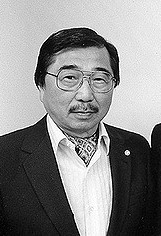Gordon Hirabayashi
| Gordon Hirabayashi | |
|---|---|

Gordon Hirabayashi in 1986
|
|
| Born |
April 23, 1918 Seattle, Washington, U.S. |
| Died | January 2, 2012 (aged 93) Edmonton, Alberta, Canada |
| Nationality | American |
| Alma mater | University of Washington |
| Occupation | Sociologist |
| Known for | Hirabayashi v. United States |
Gordon Kiyoshi Hirabayashi (平林潔 Hirabayashi Kiyoshi?, April 23, 1918 – January 2, 2012) was an American sociologist, best known for his principled resistance to the Japanese American internment during World War II, and the court case which bears his name, Hirabayashi v. United States.
Hirabayashi was born in Seattle to a Christian family who were associated with the Mukyōkai Christian Movement. He graduated from Auburn Senior High School in Auburn, Washington, and in 1937 went to the University of Washington, where he received his degree. At the University he participated in the YMCA and became a religious pacifist.
Although he at first considered accepting internment, he ultimately became one of three to openly defy it. He joined the Quaker-run American Friends Service Committee. In 1942 he turned himself in to the FBI, and after being convicted for curfew violation was sentenced to 90 days in prison. He invited prosecution in part to appeal the verdict all the way to the U.S. Supreme Court with the backing of the ACLU. One of his lawyers was the Philadelphia Quaker attorney Harold Evans. The Supreme Court, however, unanimously ruled against him in Hirabayashi v. United States (1943), albeit with three Justices filing separate opinions that concurred with the Court's decision only with certain reservations.
...
Wikipedia
